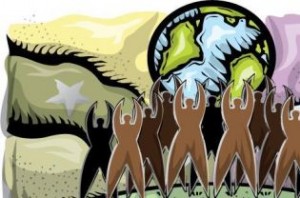-
posted by Anindya Apr 14th, 2011
 In the 1960s, Canadian media theorist Marshall McLuhan wrote with prophetic insight that the world was “no more than a village.”
In the 1960s, Canadian media theorist Marshall McLuhan wrote with prophetic insight that the world was “no more than a village.”“Electric speed at bringing all social and political functions together in a sudden implosion has heightened human awareness of responsibility to an intense degree,” he argued.
Five decades later, the prophetic has become ordinary. The term “global village” has passed into the lexicon of internationalist thinking so well that, today, it would be dramatic to suggest that we don’t live in such an interconnected world.
As a global villager, I find the term indispensable because it reflects four key aspects of the modern world.
The first is globalization, the raison d’etre of the global village. Globalization originated in the era of industrial capitalism that emerged in Europe and North America between 1848 and 1875. That era led to the emergence of a genuine world economy that, in the words of historian Eric Hobsbawm, transformed the globe from “a geographical expression into a constant operational reality.”
He added definitively: “History from now on became world history.” And world history created the global village.
Second, communications have spread from the spoken word to the written word and on to airwaves, television and the Internet. The greater availability of information has turned the world into a face-to-face society in which people behave as if they know one another personally even though they are unlikely to ever meet physically.
Communications have created overlapping but also interlocking networks of knowledge, familiarity and intimacy. Information has not overcome geographical distance but it has bridged psychological distance. The information era has peaked in the creation of a virtual village on the Internet.
Third, democracy is the lingua franca of the global village. Village chiefs — presidents, prime ministers, governors and mayors — speak this universal language. Of course, it is perfectly legitimate for global villagers to speak with an Asian or African accent, but the language itself remains a single tongue called liberal democracy.
Fourth, the degradation of the environment in pursuit of short-term greed is threatening the existence of the global village. However, the good news is that climate change and global warming have attracted worldwide attention.
Global villagers now instinctively understand the concept of the butterfly effect: the fact that a small change in one part of a complex system can have a major effect elsewhere. We now think of the world as a single ecosystem in which Rio de Janeiro is as important to Jakarta as Washington, DC.
The reality of these global linkages was clear in the recent catastrophe in Japan. The March 11 earthquake and tsunami had grave repercussions not only for the Japanese, but for the world. In terms of economy, the damage to Japan’s industry disrupted supply chains around the globe. The spread of radiation leaking from the stricken Fukushima Daiichi nuclear plant has the makings of a global ecological disaster.
But quite apart from these practical considerations, the world feels for Japan because it is part of the same village. It is a valued neighbor and an intrinsic part of the televised face-to-face society. People in the West thus have empathized with Japan’s suffering as much as the country’s Asian neighbors have. The human dimensions of the Japanese tragedy are not limited by proximity.
Another aspect of the reality of the global village — democracy — is seen in international responses to the Jasmine Revolution that has bloomed in the Arab spring.
If the citizens in the Middle East and North Africa were fighting for Islamic rights or ethnic rights, would Southeast Asians feel deeply for them? I doubt it, because most Southeast Asians are not of Arab origin, and not all of them are Muslims either.
However, since these revolutions articulate universal aspirations for democracy and human rights, Southeast Asians and others empathize with the Middle Eastern struggle. No part of the global village can be quiet when another part is burning. It is impossible to have a good night’s sleep when brave civilians are fighting for a free and democratic Libya, mile by bloodstained mile.
The Middle East uprisings say a lot about the weather in the global village today. It is spring, the season of change. Young people, with their lives ahead of them, are in the front lines when it comes to fighting for change. They do so even if they could lose their careers if anarchy prevails.
This is no small thing for young professionals who could have succeeded in the old order, chasing after narrow vested interests, but who are now fighting for new opportunities for all.
Far more frighteningly, the young stand to lose their very lives. However, they do not care for their own lives because they have decided to live for all. Their selflessness and courage in toppling autocratic regimes has resonated in every corner of the globe.
An ancient proverb says no one owns any land in this world; they inherit it only to pass it on. Everyone is a trustee in the global village, living on time borrowed from the young and those yet to be born.
What that means to me personally is that, to be a good villager, one has to take responsibility for the entire globe. That is difficult, but inescapably necessary.
Article in The Jakarta Globe, 14 April 2011.
Leave a Reply
INSTAGRAM
TWITTER
FACEBOOK
-









